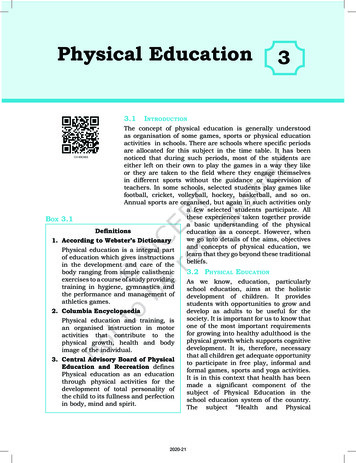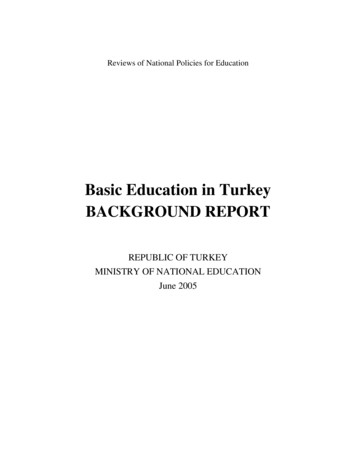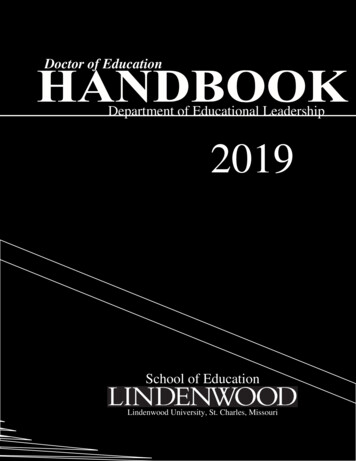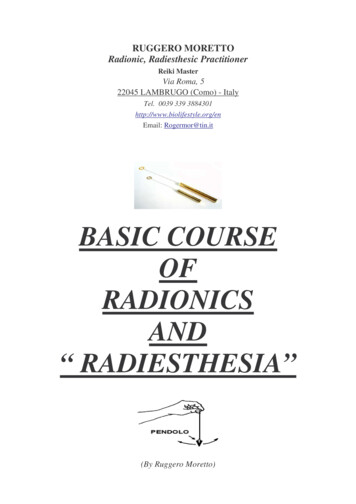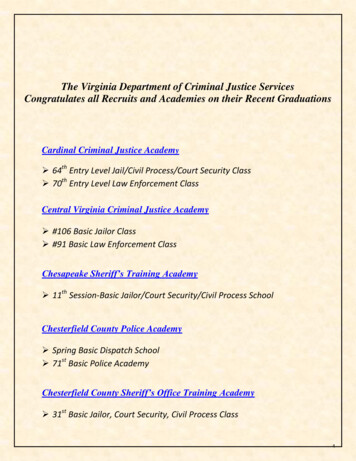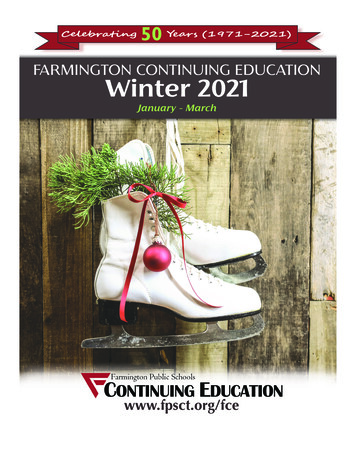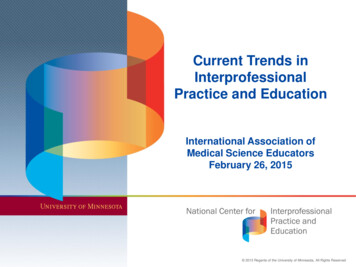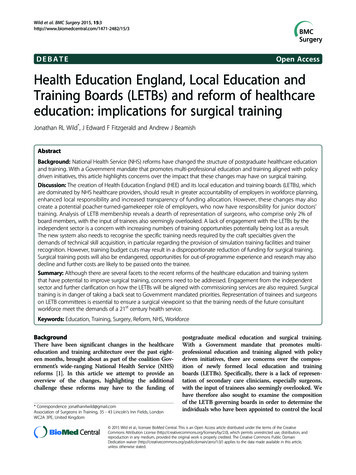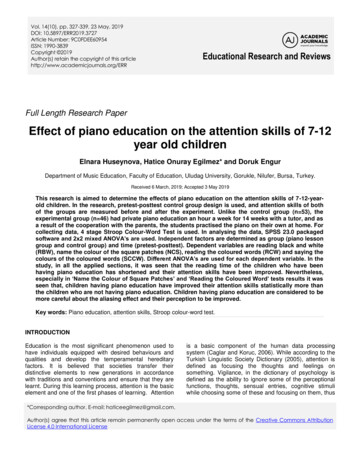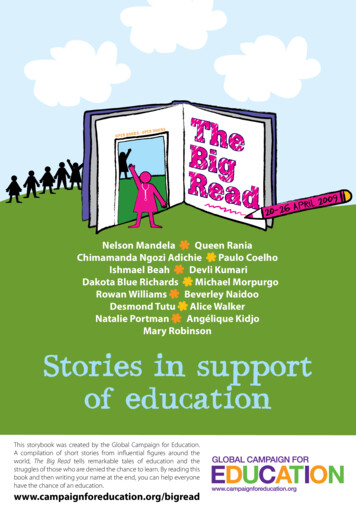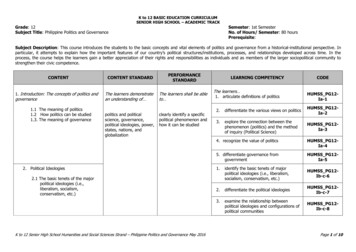
Transcription
K to 12 BASIC EDUCATION CURRICULUMSENIOR HIGH SCHOOL – ACADEMIC TRACKGrade: 12Subject Title: Philippine Politics and GovernanceSemester: 1st SemesterNo. of Hours/ Semester: 80 hoursPrerequisite:Subject Description: This course introduces the students to the basic concepts and vital elements of politics and governance from a historical-institutional perspective. Inparticular, it attempts to explain how the important features of our country’s political structures/institutions, processes, and relationships developed across time. In theprocess, the course helps the learners gain a better appreciation of their rights and responsibilities as individuals and as members of the larger sociopolitical community tostrengthen their civic competence.CONTENT1. Introduction: The concepts of politics andgovernance1.1 The meaning of politics1.2 How politics can be studied1.3. The meaning of governanceCONTENT STANDARDThe learners demonstratean understanding of politics and politicalscience, governance,political ideologies, power,states, nations, andglobalizationPERFORMANCESTANDARDThe learners shall be ableto clearly identify a specificpolitical phenomenon andhow it can be studied2. Political Ideologies2.1 The basic tenets of the majorpolitical ideologies (i.e.,liberalism, socialism,conservatism, etc.)K to 12 Senior High School Humanities and Social Sciences Strand – Philippine Politics and Governance May 2016LEARNING COMPETENCYThe learners CODE1. articulate definitions of politicsHUMSS PG12Ia-12.differentiate the various views on politicsHUMSS PG12Ia-23.explore the connection between thephenomenon (politics) and the methodof inquiry (Political Science)HUMSS PG12Ia-34. recognize the value of politicsHUMSS PG12Ia-45. differentiate governance fromgovernmentHUMSS PG12Ia-51.identify the basic tenets of majorpolitical ideologies (i.e., liberalism,socialism, conservatism, etc.)HUMSS PG12Ib-c-62.differentiate the political ideologiesHUMSS PG12Ib-c-73.examine the relationship betweenpolitical ideologies and configurations ofpolitical communitiesHUMSS PG12Ib-c-8Page 1 of 10
K to 12 BASIC EDUCATION CURRICULUMSENIOR HIGH SCHOOL – ACADEMIC TRACKCONTENTCONTENT STANDARDPERFORMANCESTANDARDLEARNING COMPETENCY4.3. Power3.1 Nature3.2 Dimensions3.3 Types3.4 Consequences4. States, Nations, and Globalization4.1 The State as different from theNation as a political concept4.2 Globalization as a context ofrelations among nation-statesPhilippine democratic politics5. Historical Background of PhilippineDemocratic Politics5.1 The evolution of Philippinepolitics, government, andgovernanceThe learners demonstratean understanding of the historicalbackground ofPhilippinedemocraticThe learners shall be ableto explain the roles ofdifferent politicalinstitutionsK to 12 Senior High School Humanities and Social Sciences Strand – Philippine Politics and Governance May 2016critique ideas that have a direct impacton how we try to manage ourselves as apolitical communityCODEHUMSS PG12Ib-c-95. analyze how political ideologies impact onthe social and political life of FilipinoHUMSS PG12Ib-c-101. define powerHUMSS PG12Id-112. recognize the nature, dimensions, types,and consequences of powerHUMSS PG12Id-123. analyze the nature, dimensions, types,deployments, and consequences of powerHUMSS PG12Id-134. assess how power is exercised in differentsituationsHUMSS PG12Id-141. define nation and stateHUMSS PG12Ie-152. differentiate nation from stateHUMSS PG12Ie-163. explain meanings of globalizationHUMSS PG12Ie-174. evaluate how globalization influencesnation-statesHUMSS PG12Ie-18The learners 1. relate the evolution of Philippinepolitics and governanceHUMSS PG12If-g-192.describe the different stages in theevolution of the Philippine politics andgovernanceHUMSS PG12If-g-203.analyze the evolution of PhilippineHUMSS PG12Page 2 of 10
K to 12 BASIC EDUCATION CURRICULUMSENIOR HIGH SCHOOL – ACADEMIC TRACKCONTENTCONTENT STANDARDPERFORMANCESTANDARDpolitics, theexecutive,the legislative, thejudiciary, anddecentralization and localgovernance6. The Executive6.1 The role of the PhilippinePresident in relation to his/herpowers7. The Legislative7.1 The role and responsibilities ofthe Philippine Senate and theHouse of Representatives8. The Judiciary8.1 The role and responsibilities ofthe Philippine JudiciaryK to 12 Senior High School Humanities and Social Sciences Strand – Philippine Politics and Governance May 2016LEARNING COMPETENCYpolitics and governanceCODEIf-g-214.assess the effects of the colonialexperience on Philippine politics andgovernanceHUMSS PG12If-g-225.appraise the influence of prior stagesof Philippine political developments oncontemporary Philippine politicsHUMSS PG12If-g-231.explain the roles and powers of thePhilippine presidentHUMSS PG12Ih-242.analyze how contemporary Philippinepresidents exercised their powersHUMSS PG12Ih-253.critique the Philippine presidents’exercise of powerHUMSS PG12Ih-261.discuss the roles and responsibilitiesof the Philippine Senate and theHouse of RepresentativesHUMSS PG12Ii-272.assess the performance of thePhilippine CongressHUMSS PG12Ii-283.appraise the impact of Congress’sperformance on PhilippinedevelopmentHUMSS PG12Ii-294.articulate a position or advocacy to aPhilippine legislator through a formalcorrespondenceHUMSS PG12Ii-301.identify the roles and responsibilitiesof the Philippine JudiciaryHUMSS PG12Ij-312.discuss how the Judiciary exercisespolitical neutrality and fairnessHUMSS PG12Ij-32Page 3 of 10
K to 12 BASIC EDUCATION CURRICULUMSENIOR HIGH SCHOOL – ACADEMIC TRACKCONTENTCONTENT STANDARDPERFORMANCESTANDARDLEARNING COMPETENCY3.9. Decentralization and LocalGovernance9.1 Local Governance in the contextof the 1991 Local GovernmentCode (LGC) of the Philippines andNational-Local GovernmentdynamicsState-society interactions10. Elections and Political Parties10.1 The nature of elections andpolitical parties in the context ofthe PhilippinesThe learners demonstratean understanding of The learners shall be ableto elections and politicalparties and civil societyand social movementsanalyze the interactionsbetween state and societyCODEEvaluate the performance of thePhilippine Judiciary as a dispenser ofjustice and a protector ofconstitutional safeguards to freedomHUMSS PG12Ij-331.identify the different levels of thePhilippine Local GovernmentHUMSS PG12IIa-b-12.explain the roles and functions ofLocal Government UnitHUMSS PG12IIa-b-23.examine how decentralization affectsgovernanceHUMSS PG12IIa-b-34.conduct an interview with barangayofficials on community programsHUMSS PG12IIa-b-45.evaluate the performance of a localgovernment unitHUMSS PG12IIa-b-5The learners 1. describe the nature of elections andpolitical parties in the PhilippinesHUMSS PG12IIc-d-6HUMSS PG12IIc-d-72.identify the types of electoral systems3.assess the implications of the type ofelectoral systems on politics andgovernanceHUMSS PG12IIc-d-84.analyze the nature of elections andpolitical parties in the PhilippinesHUMSS PG12IIc-d-911. Civil Society and Social Movements1.11.1 Political participation outsideformal institutionsdiscuss the concepts of civil societyand social movementsHUMSS PG12IIe-102.explain the contributions of civilsociety organizations and socialHUMSS PG12IIe-11K to 12 Senior High School Humanities and Social Sciences Strand – Philippine Politics and Governance May 2016Page 4 of 10
K to 12 BASIC EDUCATION CURRICULUMSENIOR HIGH SCHOOL – ACADEMIC TRACKCONTENTCONTENT STANDARDPERFORMANCESTANDARDLEARNING COMPETENCYCODEmovements to Philippine democracy3.Citizenship-in-practice12. CitizenshipThe learners shall be ableto The learners 1. explain citizenshipHUMSS PG12IIe-12HUMSS PG12IId-132.assess the various avenues for citizenparticipationHUMSS PG12IId-143.illustrate the value of citizenshipHUMSS PG12IId-15Integration1.13.1 How the concepts/ideaslearned in class can be utilizedin actual experiencesidentify issues related to politicalengagement and youth empowermentHUMSS PG12IIe-f-162.determine programs that addressissues related to political engagementand youth empowermentHUMSS PG12IIe-f-173.assess an existing program thataddresses an issue related to politicalengagement and youthempowermentHUMSS PG12IIe-f-184.conduct a research for a draftproposal on a project on politicalengagement and youthempowermentHUMSS PG12IIe-f-2012.1 The traditional and modernviews of citizenship, i.e., thestate-centric vs participatorynotions of citizenship13.The learners demonstratean understanding of evaluate the role of civil societyorganizations and social movementscitizenshippropose a project onpolitical engagement andyouth empowermentK to 12 Senior High School Humanities and Social Sciences Strand – Philippine Politics and Governance May 2016Page 5 of 10
K to 12 BASIC EDUCATION CURRICULUMSENIOR HIGH SCHOOL – ACADEMIC TRACKGLOSSARYAuthorityThe exercise of legitimate powerBureaucracyRefers to the administrative machinery of the stateCitizenA member of society who possesses rights and responsibilitiesCitizenshipMay be defined as (a) identification of an individual based on a formal-legal status coterminous with the emergence of states, or (b)shared membership of a political community in which [the] conception [of] citizens [is that of] political actors constituting political spacesCivil societyA society governed by law under the authority of a state and is distinguished from the stateConservatismA set of political beliefs based on preservation of customs and traditions that define the character of a societyDecentralizationThe transfer of authority, responsibility, and resources from the center to the lower levels of administrationDemocracyA system of governance in which rulers are held accountable for their action in the public realm by citizens, intervening (a) directly,through their own actions; or (b) indirectly, though the competition and cooperation of their elected representativesElectionsA democratic process which is a major source of political recruitment, a means of making government and of transferring government, aguarantee of representation, and a major determinant of government policyExecutiveHead of government responsible for the implementation of lawsGlobalizationRefers to processes whereby many social relations become relatively delinked from territorial geography, so that human lives areincreasingly played out in the world as a single placeGovernanceRefers to the various ways through which social life is coordinatedGovernmentOne of the institutions involved in governanceIdeologyUsually refers to a system of beliefs about how society should function, behave, and operateJudiciaryThe branch of government that is empowered to decide legal disputes and interpret law, and arbitrate disputes between branches ofgovernmentLegislatureA collection or gathering of people to make lawsLegitimacyThe popular idea that the government’s rule is rightful; legal and psychological right to governLiberalismA set of political beliefs emphasizing individual rights and libertiesK to 12 Senior High School Humanities and Social Sciences Strand – Philippine Politics and Governance May 2016Page 6 of 10
K to 12 BASIC EDUCATION CURRICULUMSENIOR HIGH SCHOOL – ACADEMIC TRACKGLOSSARYNationA complex phenomenon shaped by a collection of cultural, political, and psychological factorsNationalismThis [patriotic feeling, principles, or efforts] has three core elements: (a) nations are real; (b) membership in a nation has practicalimplications; and (3) nationhood is politically significantPatron-client relationAn exchange relationship between roles—may be defined as a special case of dyadic (two-person) ties involving a largely instrumentalfriendship in which an individual of higher socioeconomic status (patron) uses his own influence and resources to provide protection orbenefits, or both, for a person of lower status (client) who, for his part, reciprocates by offering general support and assistance, includingpersonal services, to the patronPolitical partyOrganized for the purpose of winning government power by electoral or other meansPolitical scienceThe study of politicsPoliticsMay be defined as: the art of government, public affairs, compromise and consensus, and powerPowerThe ability to achieve a desired outcome and, in politics, is usually thought of as a relationshipProportional representationAn electoral system in which candidates are elected based on the total percentage of votes cast for their partySocial movementsCollective challenges based on common purposes and social solidarities in sustained interaction with elites, opponents, and authoritiesSocialismA set of political beliefs emphasizing community and social equalityStateAn organization, composed of numerous agencies led and coordinated by the state’s leadership (executive authority), with the ability orauthority to create and implement the binding rules for all the people as well as the parameters of rule making for other socialorganizations in a given territory, using force if necessary to have its wayTheoryA systematic explanation of empirical data usually presented as reliable knowledgeK to 12 Senior High School Humanities and Social Sciences Strand – Philippine Politics and Governance May 2016Page 7 of 10
K to 12 BASIC EDUCATION CURRICULUMSENIOR HIGH SCHOOL – ACADEMIC TRACKGeneral references:Heywood, Andrew. Politics 4th ed. New York: Palgrave Macmillan, 2013.Leicht, Kevin T., and J. Craig Jenkins, eds. Handbook of Politics: State and Society in Global Perspective. New York: Springer, 2010, 218.Migdal, Joel S. Strong Societies and Weak States: State-Society Relations and State Capabilities in the Third World. Princeton University Press, 1998, 10-41.Magadia SJ, Jose J., and Edmund Ramos, “A Second Look at Democracy,” in Philippine Politics: Democratic Ideals and Realities. Ateneo de Manila University Department ofPolitical Science. Quezon City: Ateneo de Manila University Press, 2010.Moten, A., and S. Islam. Introduction to Political Science, 2nd ed. Malaysia: Thomson, 2006Rondinelli, D. Government Decentralization in Comparative Perspective: Theory and Practice in Developing Countries. International Review of Administrative Sciences 47(1981): 133-145.Scott, James C. Patron-Client Politics and Political Change in Southeast Asia. The American Political Science Review 66.1 (March 1972): 91-113.Scholte, Jan Aart., "The Globalization of World Politics", in John Baylis and Steve Smith, eds., The Globalization of World Politics: An Introduction to International Relations,2nd ed. Oxford: Oxford University Press, 2001, 13-32.Stewart, Angus. Two Conceptions of Citizenship. The British Journal of Citizenship 46.1 (March 1995): 63-78K to 12 Senior High School Humanities and Social Sciences Strand – Philippine Politics and Governance May 2016Page 8 of 10
K to 12 BASIC EDUCATION CURRICULUMSENIOR HIGH SCHOOL – ACADEMIC TRACKCODE BOOK LEGENDSAMPLE CODE: HUMSS PG12-Ia-1LEGENDSAMPLEHumanities and Social SciencesStrandTrack/ StrandunderscoreFirst EntryTrack/ Strand SubjectPhilippine Politics and GovernanceGrade Level12HUMSS PG12Roman Numeral*Zero if no specific quarterQuarterQuarterILowercase Letter*Put a hyphen (-) in between letters to indicatemore than a specific weekWeekWeeka-Arabic NumberCompetencyK to 12 Senior High School Humanities and Social Sciences Strand – Philippine Politics and Governance May 2016articulate definitions of politics1Page 9 of 10
K to 12 BASIC EDUCATION CURRICULUMSENIOR HIGH SCHOOL – ACADEMIC TRACKReferences:Heywood, Andrew. Politics 4th ed. New York: Palgrave Macmillan, 2013.Leicht, Kevin T., and J. Craig Jenkins, eds. Handbook of Politics: State and Society in Global Perspective. New York: Springer, 2010, 218.Migdal, Joel S. Strong Societies and Weak States: State-Society Relations and State Capabilities in the Third World. Princeton University Press, 1998, 10-41.Magadia SJ, Jose J., and Edmund Ramos, “A Second Look at Democracy,” in Philippine Politics: Democratic Ideals and Realities. Ateneo de Manila University Department ofPolitical Science. Quezon City: Ateneo de Manila University Press, 2010.Moten, A., and S. Islam. Introduction to Political Science, 2nd ed. Malaysia: Thomson, 2006Rondinelli, D. Government Decentralization in Comparative Perspective: Theory and Practice in Developing Countries. International Review of Administrative Sciences 47(1981): 133-145.Scott, James C. Patron-Client Politics and Political Change in Southeast Asia. The American Political Science Review 66.1 (March 1972): 91-113.Scholte, Jan Aart., "The Globalization of World Politics", in John Baylis and Steve Smith, eds., The Globalization of World Politics: An Introduction to InternationalRelations, 2nd ed. Oxford: Oxford University Press, 2001, 13-32.Stewart, Angus. Two Conceptions of Citizenship. The British Journal of Citizenship 46.1 (March 1995): 63-78K to 12 Senior High School Humanities and Social Sciences Strand – Philippine Politics and Governance May 2016Page 10 of 10
K to 12 BASIC EDUCATION CURRICULUM SENIOR HIGH SCHOOL – ACADEMIC TRACK K to 12 Senior High School Humanities and Social Sciences Strand – Philippine Politics and Governance May 2016 Page 1 of 10 Grade: 12 Semester: 1st Semester Subject Title: Philippine
